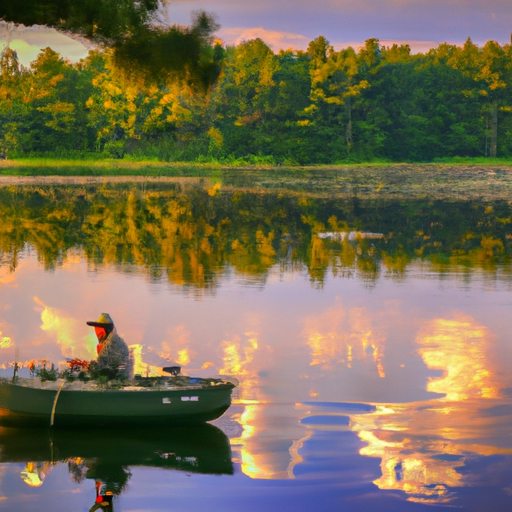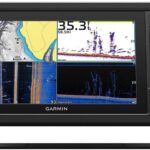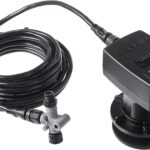Fishing isn’t just a sport or a hobby, it’s a skill that often requires keen observation, quick thinking and right decision making. Based on this, “Adapting Fishing Strategies With Changing Environmental Factors” seeks to educate you on the importance of adjusting your fishing techniques according to the varying environmental elements. No two fishing days are the same and being able to effectively adapt will significantly enhance your chances of proudly reeling in the big one. So you don’t just catch how many ever you can, but how many you really want to!
Understanding Environmental Changes in Fishing
Our environment is in a continuous state of change, and this impacts every sector, including fishing. Changes in the environment often result in alterations to ecosystems, which consequently impacts the fishing industry.
Impacts of climate change on fishing
Climate change affects the fishing industry in innumerable ways. Rising ocean temperatures, for instance, can cause fish species to migrate in search of cooler waters, affecting fish availability in certain regions. Also, climate change can lead to ocean acidification, thereby decreasing the population of shellfish and other marine species which are vital to the fishing industry.
Seasonal changes affecting fishing
Not just climate change, even seasonal changes can significantly affect fishing. Different fish species migrate, reproduce, and feed according to the seasons. As weather patterns shift due to climate change, these natural cycles can be disrupted, leading to changes in fish behavior and availability.
Unexpected changes in fishing environments
Your fishing routines may also be marred by unexpected environmental changes. Unforeseen events such as storms, floods, or oil spills can quickly alter fishing environments. These changes can deplete fish populations and leave fishing areas unsuitable for prolonged periods.
Current Impacts on Fishing Industries
Changes in the fishing environment have profound implications on the fishing industry.
Economic implications of environmental changes
Environmental changes can disrupt the economic stability of the fishing industry. As fish populations fluctuate, commercial fishermen may struggle to maintain their catches, leading to financial instability. Furthermore, the cost of implementing new fishing tactics or purchasing advanced equipment could put an additional financial burden on these fishermen.
Impacts on fish populations
Environment changes don’t just impact human beings; they also affect the fish populations themselves. Warming waters or ocean acidification can drastically decrease the number of certain species, putting them at risk of endangerment or even extinction.
Effects on local communities who depend on fishing
Local communities that rely on fishing for their livelihood are heavily impacted by environmental changes. Fluctuating fish populations mean inconsistent income, which can lead to economic stress within these communities.
Case Studies: Adapting Fishing strategies in different regions
Different regions are finding innovative ways to adapt their fishing strategies to environmental changes. Let’s take a look at some of these.
Examples of successful fishing adaptation strategies
One great example of successful adaptation is the Alaskan fisheries. They have started diversifying their catches to include a wide range of species, allowing them to withstand changes in specific fish populations. Likewise, some fishing communities in the Pacific Isles are reverting to traditional fishing methods that are better suited to changing environmental patterns.
Case study of failed adaptation
However, not all attempts at adaptation are successful. For example, some communities have tried to maintain their catches by overfishing, which ultimately depletes fish populations and makes the situation worse. This approach is not sustainable and can lead to long-term environmental damage.
Analysis of adaptive strategies in different fishing communities
It’s crucial to study a variety of different fishing communities to gain a complete understanding of potential adaptation strategies. Many communities are trying to balance their needs with environmental sustainability, often with varying degrees of success.
Adaptive Techniques for Coastal Fishing
There’s a range of effective adaptive techniques that coastal fishermen can employ to counter environmental changes.
Altering fishing times
In response to changing seasonal patterns, fishermen could alter their fishing times. This means going fishing at different times of the year, or even different times of the day, to negate the effects of changing fish behavior.
Exploring new territories
As fish populations migrate due to changing water temperatures, fishermen may need to expand their fishing territories. Though this involves some risk and investment, it’s a viable strategy to keep up with migrating fish populations.
Modifying fishing gear to suit changing environments
Changes in the environment can imply that traditional fishing gear is no longer effective. In such scenarios, modifying the existing fishing gear to better suit the new conditions is a practical approach.
Adaptive Techniques for Deep-Sea Fishing
Deep-sea fishing also requires adaptation to overcome environmental changes.
Adapting to changing water temperatures
Fish species in deeper waters can shift their habitat profiles in response to changing water temperatures. Hence, fishermen may need to adapt by altering their fishing depths or shifting their fishing zones.
Adopting environmentally friendly fishing methods
Overcoming environmental changes also means helping to slow them down. By adopting sustainable fishing methods, such as using biodegradable nets or avoiding overfishing, deep-sea fishermen contributes to the overall health of the ocean.
Adjusting to changes in fish migration patterns
Just like with coastal fishing, adjusting to changes in fish migration is also crucial in deep-sea fishing. With the aid of advanced technologies, deep-sea fishermen are able to track the new routes along which fish populations are moving and make necessary adjustments.
Technological Aids for Adaptive Fishing
Technology plays a crucial role in helping fishermen adapt to environmental changes.
Utilizing GPS technology
GPS technology is used to track fish migration patterns accurately. This can immensely assist fishermen in locating their catch, particularly when fish have moved due to environmental changes.
Adoption of sustainable fishing gear
New sustainable fishing gear, like nets made from biodegradable materials, can help to counter the negative effects of fishing on the environment. Such equipment not only reduces damage to the ocean but also helps maintain fish populations.
Use of sonar and other technologies to locate fish
Sonar technology, drones, and other advanced equipments are increasingly being used to locate fish in the wake of changing environments. Such technologies can help fishermen adapt to changes more efficiently and pursue their duties without over-exerting fish populations.
Policy and Regulatory Changes
Governmental policies and regulations can also support adaptive fishing.
Government regulations for sustainable fishing
Government regulations can ensure a balance between the needs of the fishing industry and the health of our oceans. By setting catch limits, protecting certain species, or designating marine protected areas, governments can encourage sustainable fishing.
Impact of international fishing laws on local communities
International fishing laws play an essential role in managing global fish populations. However, these can also impact local fishing communities, requiring them to adapt their techniques to align with global objectives.
Adaptive regulation measures in response to environmental change
As the environment evolves, so should our regulations. Governments are continually updating their policies to reflect current environmental conditions and promote sustainable fishing practices.
Role of Community Engagement in Adaptive Fishing
Community engagement is paramount in the shift towards adaptive fishing strategies.
Importance of community knowledge in adapting to change
The past experiences and indigenous knowledge of fishing communities can be of immense value in adapting to environmental changes. Such traditional wisdom, when coupled with scientific understanding, can help develop effective fishing strategies.
Creating a sustainable fishing culture
Fostering a culture that values sustainable fishing can immensely help promote adaptive fishing techniques. By instilling respect for the ocean and its inhabitants within the community, it becomes easier to adopt fishing strategies that are environmentally sustainable.
Community driven initiatives for adaptive fishing
Communities can take initiative by organizing awareness drives or cooperative fishing initiatives. By sharing resources and knowledge, they can proactively implement the necessary changes to adapt to their changing environment.
Awareness and Education for Adaptive Fishing
Educating fishermen about the need for and methods of adaptive fishing is a crucial aspect of change.
Educational programs for fishermen
Through educational programs, fishermen can be taught about the effects of environmental changes on fishing and the need for adaptation. Such programs can help them understand the various adaptive techniques at their disposal.
The role of media in creating awareness
Media platforms can be effectively utilized to spread awareness about the need for adaptive fishing. By highlighting success stories and explaining the impacts of environmental changes on fishing, media can play a significant role in fostering a mindset of adaptability and sustainability.
Promoting adaptive fishing practices through campaigns
Campaigns that promote adaptive fishing practices can reach a broad audience and bring about change on a larger scale. Through interactive and engaging content, these campaigns can motivate fishers to adapt their strategies in the face of environmental changes.
Future of Adaptive Fishing
Adapting to changing environmental conditions is the future for sustainable fishing. The challenges may be significant, but those in the fishing industry are working hard to ensure a stable future.
Implications of continued environmental change
If the current environmental changes persist, the implications for fishing could be severe. As fish populations change and climates evolve, the fishing industry must be prepared to continually adapt.
Predicted shifts in fishing practices
In the future, fishing practices are likely to become increasingly sustainable and flexible in order to accommodate environmental changes. Digital technologies and bio-friendly equipment may become the norm while overfishing will be discouraged.
Potential solutions for sustainable fishing in the future
There are various potential solutions, such as investing in research to develop innovative fishing techniques and supporting initiatives that promote sustainable fishing. Such actions can not only ensure the continuity of the fishing industry but also contribute positively to the health of our oceans. So, the future of adaptive fishing lies in embracing change and being prepared for whatever comes next.










